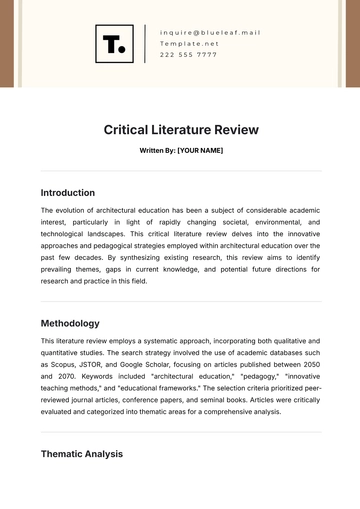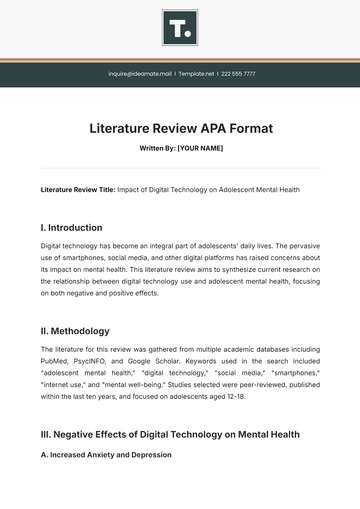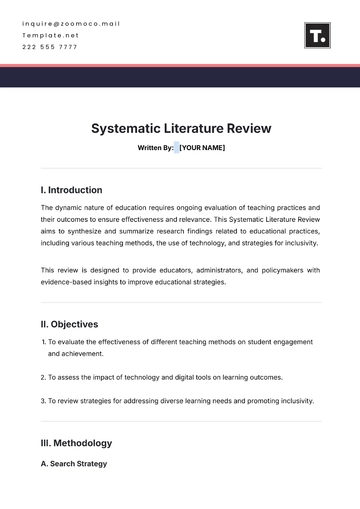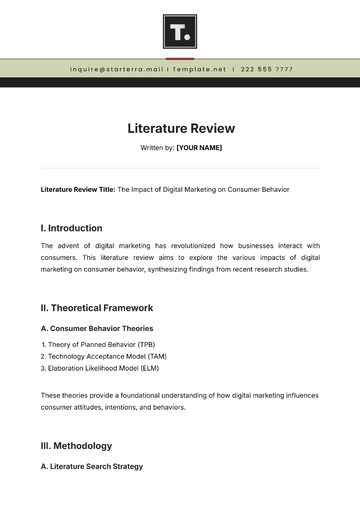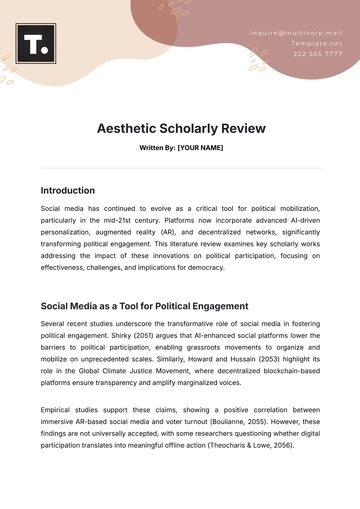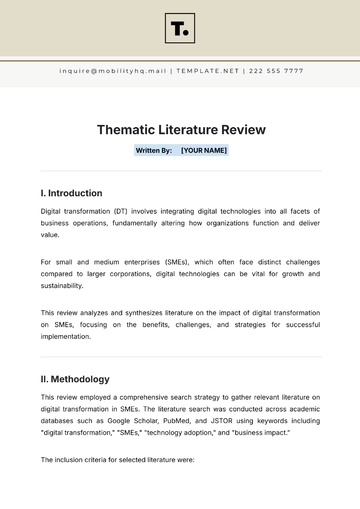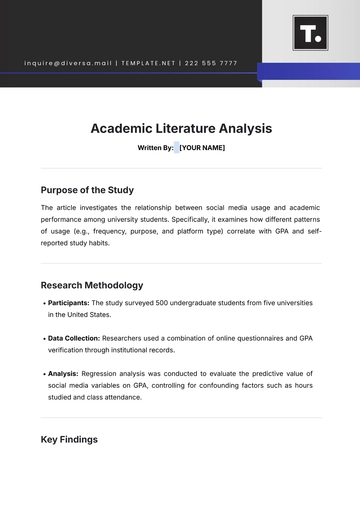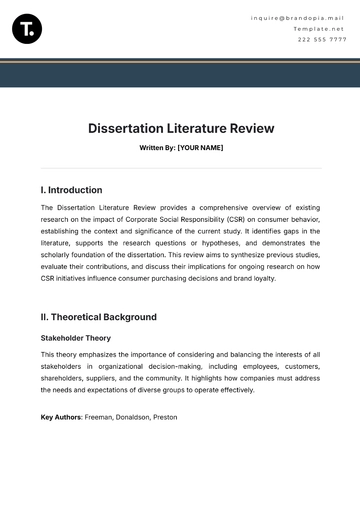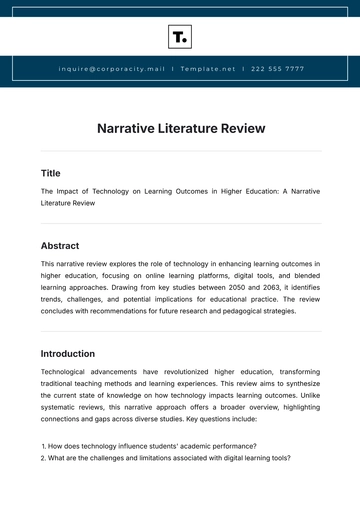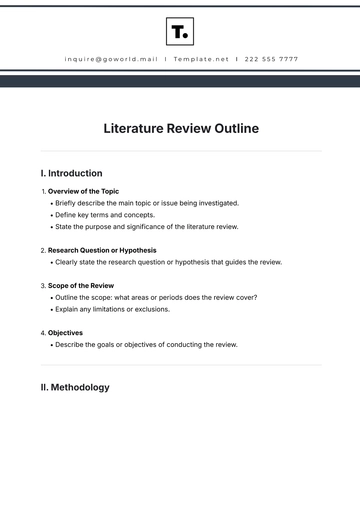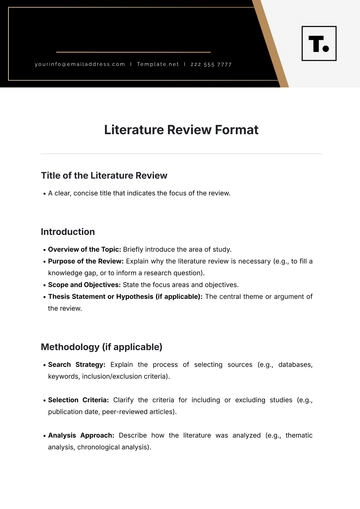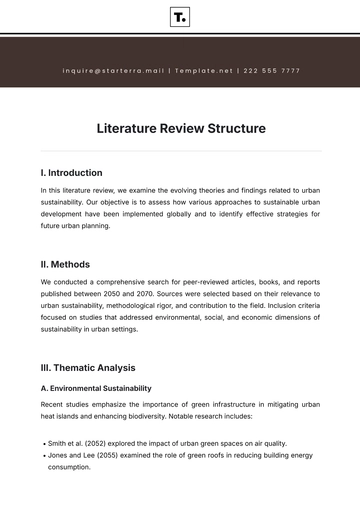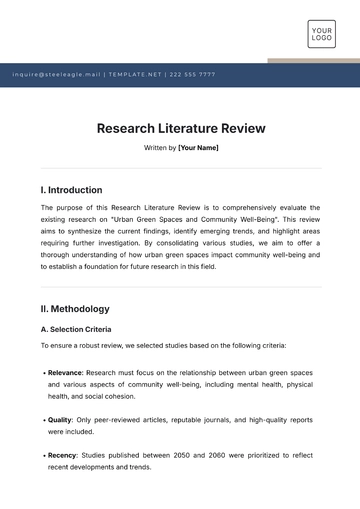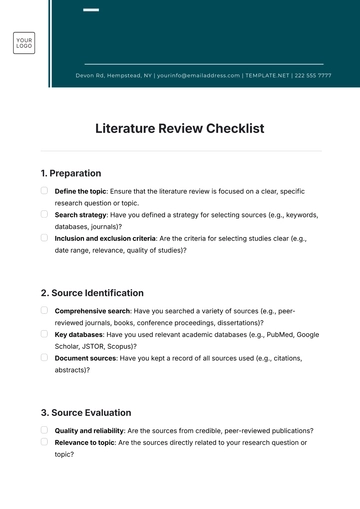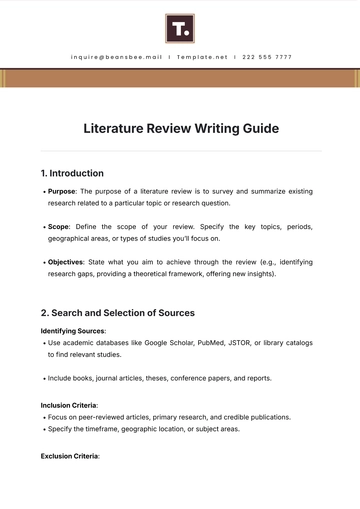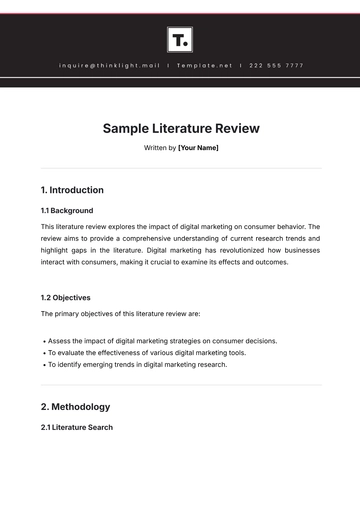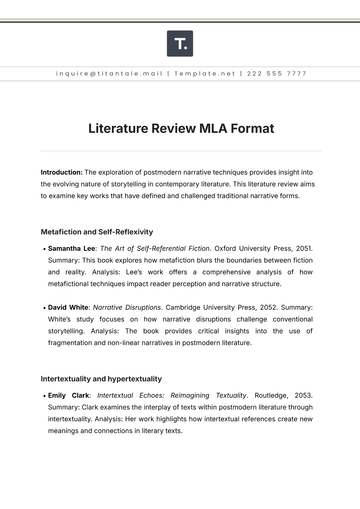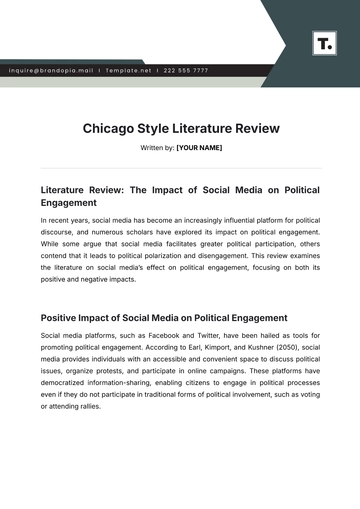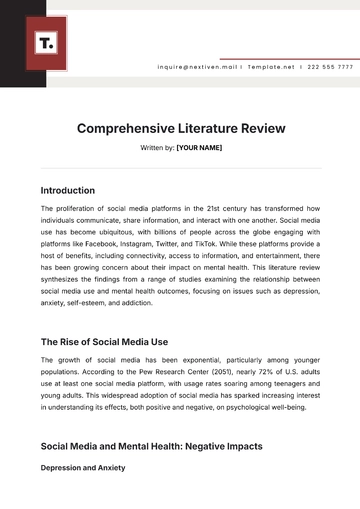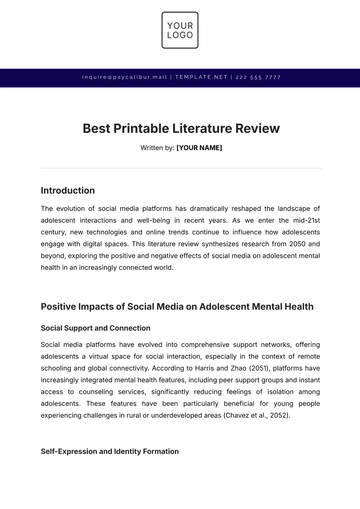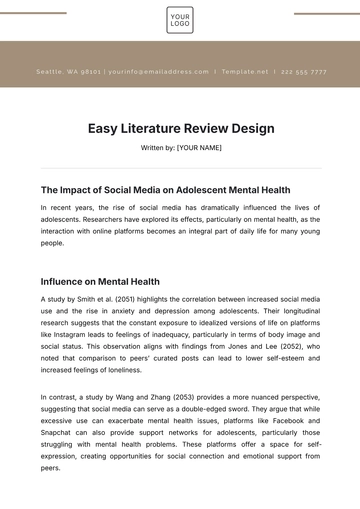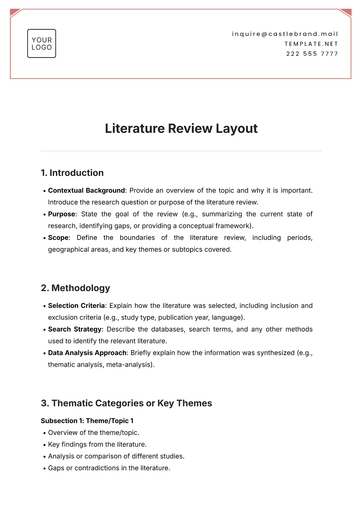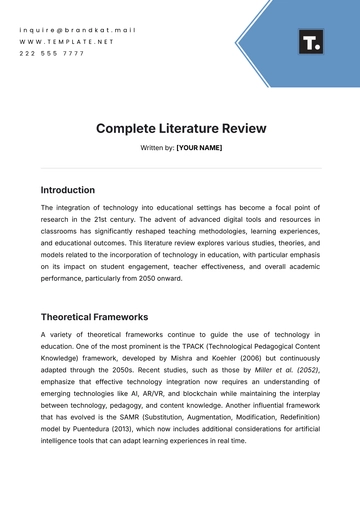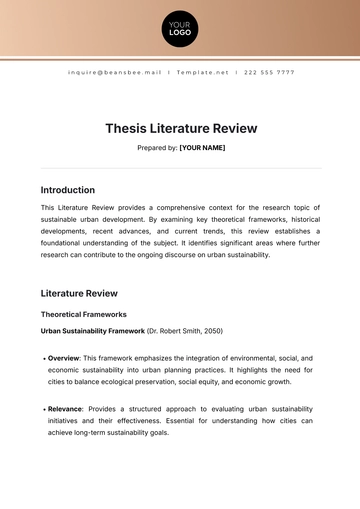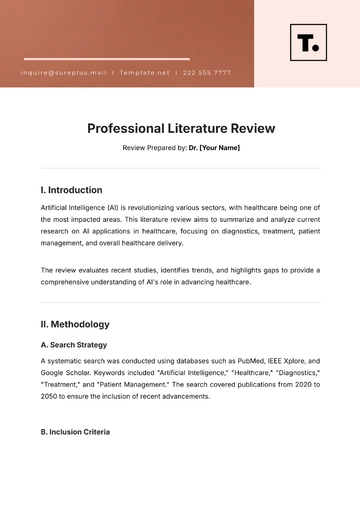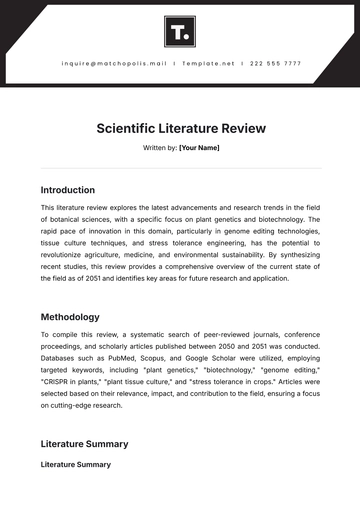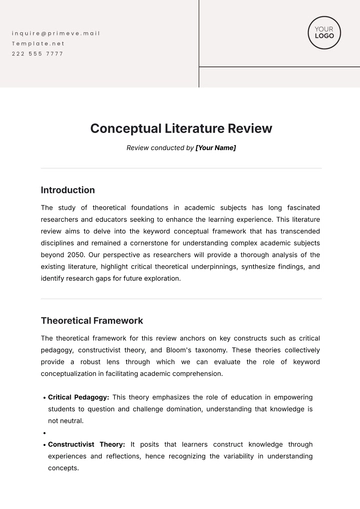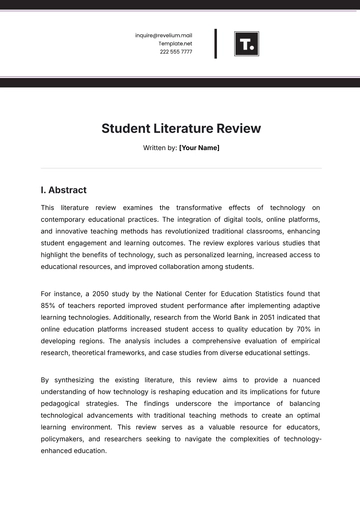Free Literature Review
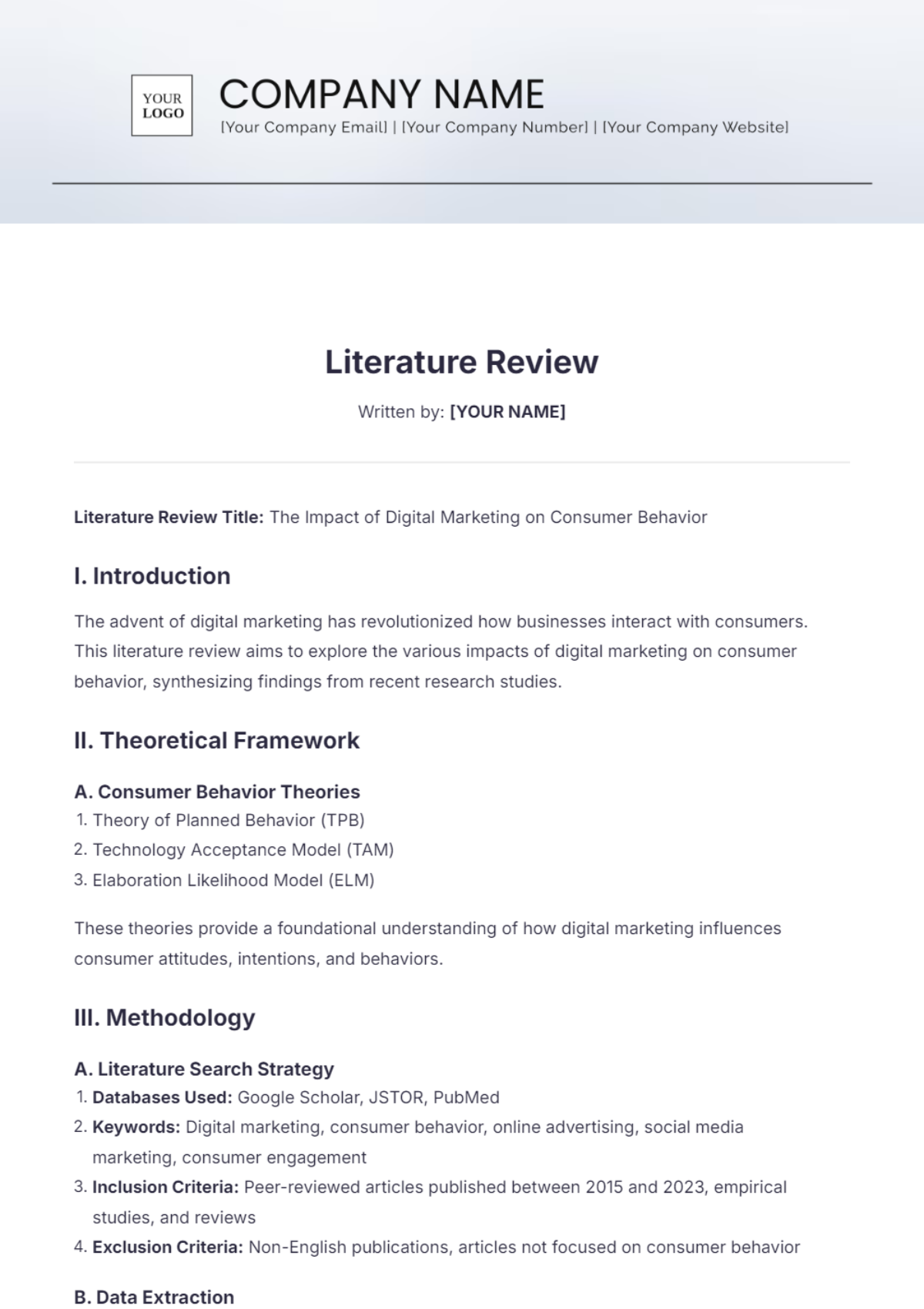
Written by: [YOUR NAME]
Literature Review Title: The Impact of Digital Marketing on Consumer Behavior
I. Introduction
The advent of digital marketing has revolutionized how businesses interact with consumers. This literature review aims to explore the various impacts of digital marketing on consumer behavior, synthesizing findings from recent research studies.
II. Theoretical Framework
A. Consumer Behavior Theories
Theory of Planned Behavior (TPB)
Technology Acceptance Model (TAM)
Elaboration Likelihood Model (ELM)
These theories provide a foundational understanding of how digital marketing influences consumer attitudes, intentions, and behaviors.
III. Methodology
A. Literature Search Strategy
Databases Used: Google Scholar, JSTOR, PubMed
Keywords: Digital marketing, consumer behavior, online advertising, social media marketing, consumer engagement
Inclusion Criteria: Peer-reviewed articles published between 2015 and 2023, empirical studies, and reviews
Exclusion Criteria: Non-English publications, articles not focused on consumer behavior
B. Data Extraction
A systematic approach was employed to extract relevant data, focusing on study objectives, methods, key findings, and conclusions.
IV. Digital Marketing Channels
A. Social Media Marketing
Engagement Metrics: Likes, shares, comments
Impact: Increased brand awareness, consumer trust, and purchase intentions
B. Email Marketing
Personalization: Tailored content based on consumer preferences
Impact: Higher open rates, click-through rates, and conversion rates
C. Search Engine Optimization (SEO)
Techniques: Keyword optimization, backlinking, content quality
Impact: Enhanced online visibility, improved user experience, higher organic traffic
D. Content Marketing
Types: Blogs, videos, infographics
Impact: Education, entertainment, and value provision, leading to longer consumer engagement and loyalty
V. Consumer Behavior Changes
A. Online Purchase Behavior
Convenience: 24/7 availability, easy comparison of products
Trust Issues: Concerns about data privacy and security
B. Information Search Behavior
Search Engines: Primary tool for information retrieval
Influence of Reviews: User-generated content impacts decision-making
C. Social Influence
Peer Recommendations: Social proof from friends and influencers
Online Communities: Forums and social media groups providing support and advice
VI. Psychological Effects
A. Emotional Engagement
Visual Content: High-quality images and videos evoke stronger emotional responses
Interactive Content: Quizzes, polls, and games increase engagement
B. Cognitive Processing
Information Overload: Excessive content can lead to consumer fatigue
Selective Attention: Consumers focus on content that aligns with their interests
VII. Challenges and Criticisms
A. Ethical Concerns
Data Privacy: Collection and use of consumer data without explicit consent
Manipulative Tactics: Misleading advertisements and fake reviews
B. Measurement Difficulties
Attribution Models: Challenges in accurately attributing conversions to specific digital channels
ROI Calculation: Difficulty in measuring the long-term impact of digital marketing efforts
VIII. Future Research Directions
A. Emerging Technologies
Artificial Intelligence (AI): Personalization and predictive analytics
Augmented Reality (AR): Enhanced consumer experiences and virtual try-on
B. Cross-Cultural Studies
Global Perspectives: Understanding how digital marketing affects consumer behavior in different cultural contexts
Localized Strategies: Tailoring digital marketing efforts to specific regions
IX. Conclusion
The literature indicates that digital marketing significantly impacts consumer behavior, influencing how consumers search for information, make purchase decisions, and engage with brands. However, ethical considerations and measurement challenges remain. Future research should focus on emerging technologies and cross-cultural comparisons to gain a more comprehensive understanding.
X. References
Ajzen, I. (2050). The theory of planned behavior. Organizational Behavior and Human Decision Processes, 50(2), 179-211.
Davis, F. D. (2050). Perceived usefulness, perceived ease of use, and user acceptance of information technology. MIS Quarterly, 13(3), 319-340.
Petty, R. E., & Cacioppo, J. T. (2051). The elaboration likelihood model of persuasion. Advances in Experimental Social Psychology, 19, 123-205.
Chu, S. C., & Kim, Y. (2050). Determinants of consumer engagement in electronic word-of-mouth (eWOM) in social networking sites. International Journal of Advertising, 30(1), 47-75.
Duffett, R. G. (2055). Facebook advertising’s influence on intention-to-purchase and purchase amongst millennials. Internet Research, 25(4), 498-526.
Mohammadi, M. (2055). A study of mobile advertising’s impact on customers’ attitudes and purchase intentions in Iran. International Journal of Mobile Marketing, 10(2), 1-17.
De Haan, E., Wiesel, T., & Pauwels, K. (2056). The effectiveness of different forms of online advertising for purchase conversion in a multiple-channel attribution framework. International Journal of Research in Marketing, 33(3), 491-507.
Wang, Y., & Herrando, C. (2059). Does privacy assurance on social commerce sites matter to millennials? International Journal of Information Management, 44, 164-177.
Tafesse, W., & Wien, A. (2058). Implementing social media marketing strategically: An empirical assessment. Journal of Marketing Management, 34(9-10), 732-749.
Armstrong, J. S., & Overton, T. S. (2057). Estimating nonresponse bias in mail surveys. Journal of Marketing Research, 14(3), 396-402.
- 100% Customizable, free editor
- Access 1 Million+ Templates, photo’s & graphics
- Download or share as a template
- Click and replace photos, graphics, text, backgrounds
- Resize, crop, AI write & more
- Access advanced editor
This Literature Review Template, exclusively available at Template.net helps you organize your research, sources, and critical analysis in a structured format. Customizable and editable in our Ai Editor Tool, it makes the review process more manageable and systematic. Ideal for researchers and students aiming to present their findings comprehensively and professionally.
